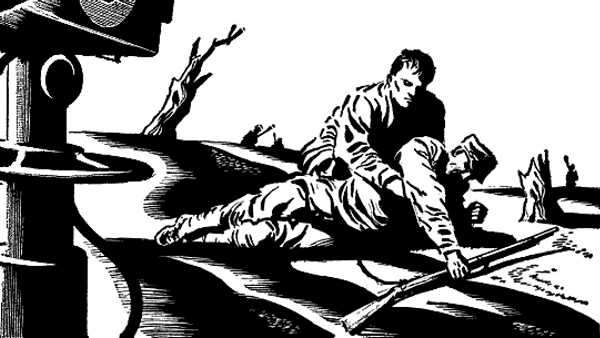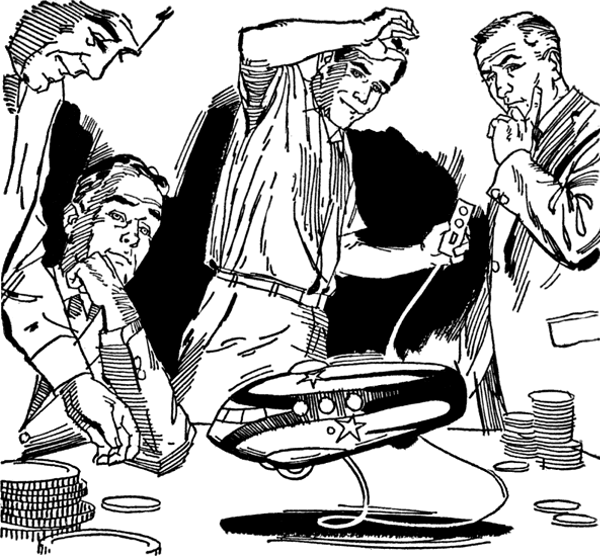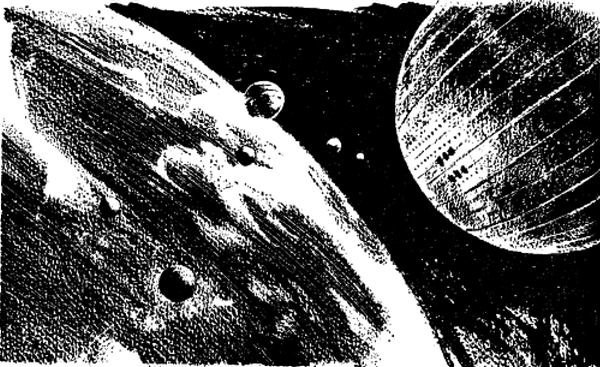
by Gideon Marcus
It's all in who you know
This month, the legendary Earl Warren, former governor of my state of California, and Chief Justice during one of the Supreme Court's most dramatic eras, announced that he was stepping down. No sooner had he done this that President Johnson tapped Abe Fortas, Associate Justice since 1965, for the chief position among the top black-robes.

Fortas and LBJ go way back, all the way to 1948's Texas Democratic primary for Senator, when the young lawyer successfully won a legal challenge to LBJ's victory. Since then, their stars have been interlinked. Some of Fortas' fellow justices (and many newspapers) suggest that the Justice and the President's relationship is a bit too chummy. Still, Fortas has been a good, liberal judge, and he'd probably be a fine Chief Justice. Sometimes the good ol' boy network doesn't hurt anybody.
This segues nicely into my review of this month's issue of Analog. Campbell, like many SF magazine editors, has a stable of reliable authors. This means he always has work of a certain quality to fill his issues. It also tends to crowd out new talent. This results in a kind of conservatism, and often a bit of mediocrity. This month, however, things work out a bit better than average.
Let's take a look!

by Kelly Freas
Familiar faces
Hawk Among the Sparrows, by Dean McLaughlin

by Kelly Freas
Howard Farman is the pilot of the Pika-don, a cross between the SR-71 hypersonic recon plane and the VTOL "Harrier" (which is about to enter British service). On a mission to monitor a French weapons test, some scientificish gobbledegook happens, knocking Farman back in time to 1917–the midst of The Great War. Sort of a reverse of the Twilight Zone episode, The Last Flight.
Once there, he finds himself ensconced with a French fighter squadron. They are being trounced by a German Ace. Eighty men died trying to break his spree, but no one can stop the bloody Red Baron of Germany. Actually, it's not Richtofen; it's a fictional(?) #2, for whom there is no canine counterpart.

Farman is convinced that he can turn things around if he can just get his advanced fighter off the ground, something that will require building a whole industry of jet fuel production. And even once he manages that, his missiles and radar won't track the wood-and-canvas Fokkers of the enemy. What to do?
This is a very pleasant story, quite readable. It does have a few holes big enough to ram a Nieuport through. For one, it is most unrealistic that a man from 1975 with ten thousand flight hours would have no understanding of propeller planes. You can't get Air Force wings today without first racking up dozens of hours in simple prop aircraft, and Farman must have first gotten commissioned before or around 1968. Maybe if the jet came from some time in the 21st Century, it'd be more plausible (though I can't imagine ever starting fighter jocks on jets–that's a recipe for disaster).
The second hole is that Farman is oblivious for far too long of the effects of the jet wash, something with which he should be intimately familiar.
Finally, while I appreciate the nod to logistics, what with Farman needing to manufacture kerosene for his plane, it strains credulity that a super-advanced jet could reliably fly after several months in a field with no maintenance.
Four stars, but it is clear that McLaughlin (who has been AWOL from Analog since 1964) does not have a strong aviation background.
Null Zone, by Joe Poyer

by Kelly Freas
How does one stop the Ho Chi Minh trail, when it is really a vast network of mini-trails with far too many branches to interdict? By building a highway of nuclear waste across it, of course!
Joe tells an engaging story, with the spark of color with which he always imbues his technical pieces. But I can't imagine the logistics of transport/production make this a feasible possibility, never mind the humanitarian aspects. Does editor Campbell ever mind the humanitarian aspects?
Three stars.
"To Sleep, Perchance to Dream … ", by W. C. Francis

by Kelly Freas
Alright, there's always an exception that proves the rule. I've never heard of Francis before, so I guess Campbell did save a slot for a novice.
On the way to the stars, a spaceman in stasis finds himself lost in an increasingly convoluted nightmare. Is this part of the process, or has something gone off the rails?
Reading this story was akin to hearing someone tell you about the dreams they had last night. It's usually fascinating for the teller and dull for the audience. The ending to the tale, however, pulls this piece into the low three star range.
Winkin, Blinkin and πR²?, by R. C. FitzPatrick

by Kelly Freas
I think this one takes place in the same setting as The Circuit Riders from six years back. Cops are using emotion detectors to track down a gang of bank robbers. For the most part, the criminals keep their cool, but every so often, their ring-leader blows his stack, and it pops up as a blip on a scope at police HQ.
Kind of a dull tale, this police procedural, with a lot of casual grousing and bickering in lieu of characterization. Probably the worst piece in the mag.
Two stars.
Icarus and Einstein, by R. S. Richardson

Analog's resident astronomer offers up a science fact piece about the Earth-grazing (comparatively) asteroid of Icarus. The bulk of the piece is on how the mile-long hunk of rock could be used to test General Relativity, in the same way Mercury has been.
It's a fascinating topic, though Richardson fails to explain why General Relativity affects orbits. This is a common failing of all works on the topic, mainly because the explanation is not particularly simple to relate. Well, maybe it's not. Let me try:
There is a Special Relativity variant of Newton's law of motion, in which a bit (expression) is added to the equation to factor for an object's proximity to the speed of light. It can generally be omitted at the low speeds we're used to since the speed of light is on the bottom of that fraction, and thus, it comes out pretty close to zero most of the time.
Similarly, with General Relativity, in addition to the effect of gravity being equal to the proportion of the masses of two objects divided by the square of their distance, there's an additional expression that factors in the warping of space by the gravity of a mass, which gets higher the closer one gets to it. As in the Special Relativity equation, the value of this expression is usually close to zero. But when the object is as massive as the Sun, and the other object gets really close, it becomes significant.
There. That wasn't so hard.
Anyway, the problem with the article isn't the content, but the presentation. I understood it, but I also majored in astrophysics. I suspect most people will scratch heads in confusion. Which is a little weird; Richardson is usually better than that.
Three stars.
Satan's World (Part 3 of 4), by Poul Anderson

by Kelly Freas
If you recall the last installment of this serial, merchant captain David Falkayn and his raccoon-like associate, Chee Lan, had arrived at the mysterious world of Satan. The planet had been in a deep freeze for eons, but now it is approaching its hot sun, and its cryosphere is evaporating, uncovering a bonanza of valuable minerals. But 23 alien warships have suddenly also appeared, and a confrontation is inevitable.
When it occurs, Falkayn is surprised to find that Latimer, one of the five shareholders for Serendipity Inc. (the knowledge brokers that have become a linchpin of the galactic economy), is working for Gahood, a member of the minotaur-like race of aliens called the Shenn. The Shenn are using Serendipity as a kind of fifth column, and they are the first real threat to the Galactic Commonwealth.
Some genuinely thrilling scenes ensue. I particularly liked the evocative bit where Falkayn's ship, the Muddlin' Through, careens through the stormy atmosphere of Satan, 19 robotic destroyers in hot pursuit. I kept thinking, "You can't find this kind of imagery anywhere but in books. Movie technology just can't capture such magic the way the printed word can."
But just as I was about to give this segment a four on the Star-o-meter, the last five pages brought back the bawdy merchant Van Rijn and the collossal bore, Adzel, along with five pages of expositional writing.
Back to three it goes! Conclusion next month.
Leveraging human capital

I don't say this too often, but thank goodness for Analog! Clocking in at 3.1 stars, it and Fantasy and Science Fiction (3.3) are the only mags that ended above the 3 star line.
The other mags included IF (2.9), New Worlds (2.7), Galaxy (2.6), and Amazing (2.5).
You could fit all of the above-3 stuff in a single magazine (wouldn't that be nice?) And women accounted for just 2.6% of all the new material–that is to say, thanks to Carol Emshwiller and F&SF from keeping this month from being a stag shut-out.
Another reason to look beyond plowed pastures for talent–we might get more stories by women-folk in our mags!

![[June 30, 1968] Hawk among the sparrows (July 1968 <i>Analog</i>)](https://i0.wp.com/galacticjourney.org/wordpress/wp-content/uploads/2023/06/680630cover.jpg?resize=672%2C372)

![[March 20, 1968] Missed opportunities (April 1968 <i>Fantasy and Science Fiction</i>)](https://i0.wp.com/galacticjourney.org/wordpress/wp-content/uploads/2023/03/680320cover.jpg?resize=666%2C372)






![[December 31, 1967] Surprise, surprise! (January 1968 <i>Analog</i>)](https://i0.wp.com/galacticjourney.org/wordpress/wp-content/uploads/2022/12/671231cover.jpg?resize=669%2C372)









![[February 28, 1967] The Big Stall (March 1967 <i>Analog</i>)](https://i0.wp.com/galacticjourney.org/wordpress/wp-content/uploads/2022/02/670228cover.jpg?resize=672%2C372)










![[December 31, 1965] Untermag (January 1966 <i>Analog</i>](https://i0.wp.com/galacticjourney.org/wordpress/wp-content/uploads/2020/12/651231cover.jpg?resize=600%2C372)








![[July 31, 1965] A spoonful of sugar (August 1965 <i>Analog</i>)](https://i0.wp.com/galacticjourney.org/wordpress/wp-content/uploads/2020/07/650730cover.jpg?resize=672%2C372)












![[October 20, 1964] The Struggle (November 1964 <i>Fantasy and Science Fiction</i>)](https://i0.wp.com/galacticjourney.org/wordpress/wp-content/uploads/2019/10/641020cover.jpg?resize=660%2C372)














